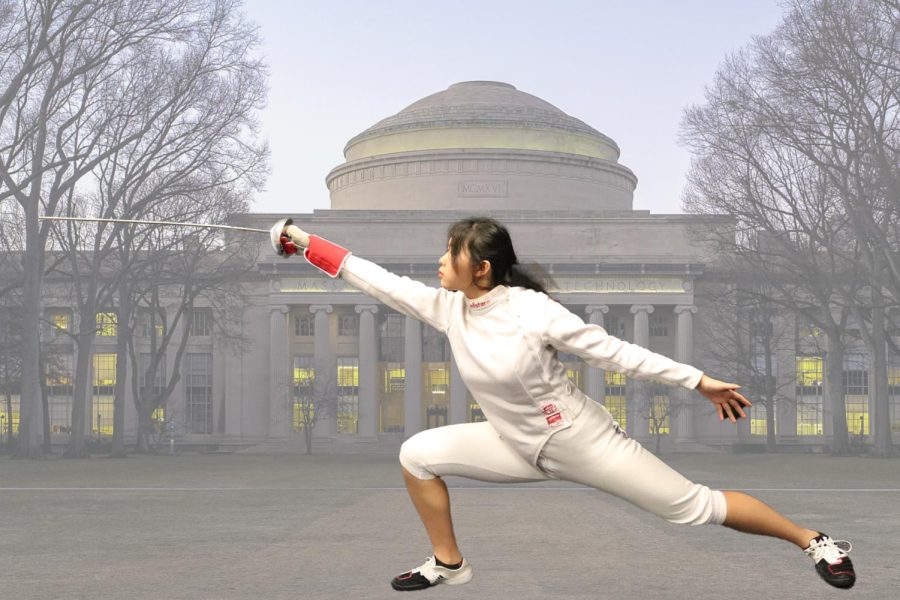Priscilla Leang commits to Massachusetts Institute of Technology for fencing
February 6, 2023
Senior Priscilla Leang will be fencing for Massachusetts Institute of Technology.
Senior Priscilla Leang began fencing in her first grade with her older sister, class of 2021 alumnus Andrea Leang. Since then, the sport has followed her changes of residence, from New Jersey to China to California. In the fall of 2023, Priscilla will rejoin her sister to fence for Massachusetts Institute of Technology.
Priscilla began fencing due to the rivalry between her mother and her neighbor, who boasted about her son’s awards in fencing. The following year, Priscilla bid goodbye to her New Jersey fencing community, and she found a new team and coach in China, where she lived for four years. Currently, Priscilla fences for the Academy of Fencing Masters in Campbell, Calif.
Priscilla’s first international tournament was the 2020 Pan American Championships for Cadets in El Salvador, which she took part in as a member of Team USA along with her sister. However, in the first round of direct eliminations, she had to fence her sister.
“I was super stoked to participate,” Priscilla said. “But I was disappointed when I realized I traveled all the way there just to be eliminated by my sister.”
When the pandemic hit, Priscilla and Andrea were unable to train at their fencing club, so they practiced at home, converting part of their garage into a practice room.
“My sister and I have always been fencing together and would get frustrated at each other too,” Priscilla said. “But I’ve improved so much because of her, and I’m really grateful for her.”
Fencing requires a large time commitment, especially due to the extended commute times involved with traveling to distant competitions. Priscilla has managed to find a balance between her academics and fencing through making use of all the time she can find to complete her work. For example, after her defeat in the 2020 Pan American Championships, she passed the bronze level of the United States of America Computing Olympiad while she waited for her sister to finish competing. Priscilla feels thankful for being able to discover this balance in high school, and will continue to use those strategies in MIT to stay successful both in the classroom and the arena.
“I do my work whenever I can, because I’m not the best at planning,” Priscilla said. “I often remind myself that, as an athlete, I can’t afford to be distracted and that forces me to manage my time better.”
Priscilla cites her strategizing skills as the reason she can excel at fencing. In fact, many fencers refer to the sport as games of physical chess, demonstrating the importance of tactics: knowing how and when to fake or trick the opponent. This contrasts with football, which she joined in her senior year, a sport that is based more on strength and speed.
“I am not as fast as my peers,” Priscilla said, “but I have a good sense of distance and timing, which I base my strategy on.”
Since fencing is heavily reliant on strategy, mental blocks are particularly disastrous, and they have jeopardized her confidence. When she was in a rut, Priscilla felt helpless as to how to improve. For a while, she couldn’t figure out how to utilize a more diverse range of techniques, as she did not feel confident in moves other than two she depended on.
“I didn’t know what to do,” Priscilla said. “I couldn’t think past the basic moves I always fell back on.”
Priscilla’s dream school has been MIT, partly because it’s where her sister attends. More importantly, Priscilla is looking to pursue further learning in engineering. MIT not only has the high rankings that would fulfill those goals, its entire culture is deeply rooted in technology, invoking engineering into everyday tasks. Priscilla was fascinated by MIT’s fencing research, which her sister participated in. The data-driven training uses virtual reality techniques, sourced from the movements of more experienced fencers, to help inexperienced fencers improve.
“What other school involves technology in sports, much less to say in such a niche sport?” Priscilla said.
MIT is unique from other schools in another way, as they expect their athletes to be accepted into the school on terms of their own academic merit before they commit to an intercollegiate sport. In fact, Priscilla had been advised against applying to MIT, as she had already received an offer from Johns Hopkins University. Though MIT does not offer pre-reads, Priscilla applied with a recommendation letter from MIT’s fencing coach, after he determined her to be qualified enough for the team.
“His recommendation letter was the icing on the cake,” Priscilla said. “I appreciate his support and belief in me.”
Priscilla is leaning toward pursuing engineering in college, though she ultimately plans to keep her choices open and explore all that MIT has to offer. She is particularly interested in joining MIT’s poker club. As an athlete, Priscilla looks forward to qualifying for NCAA Regionals.
Priscilla decided to be a student athlete because she values being part of a strong community, especially in college. Furthermore, she wants to stay fit. And after fencing for 12 years, Priscilla can’t imagine herself without her epee.
“Even though I have a love-hate relationship with fencing, it has been part of my life for so long.” Priscilla said. “My relationship with fencing is the same as how most parents love their children despite being annoyed from time to time.”
For fencers and aspiring student athletes, Priscilla emphasizes the importance of never giving up on yourself. No matter how slim the chances may seem, there will always be a chance to make a comeback.
“If you can’t find a way, make a way,” Priscilla said. “There will never be a totally unbeatable opponent or strategy. Even if your technique may not be skillful enough to pull off one particular move, there is going to be another you may win with.”

